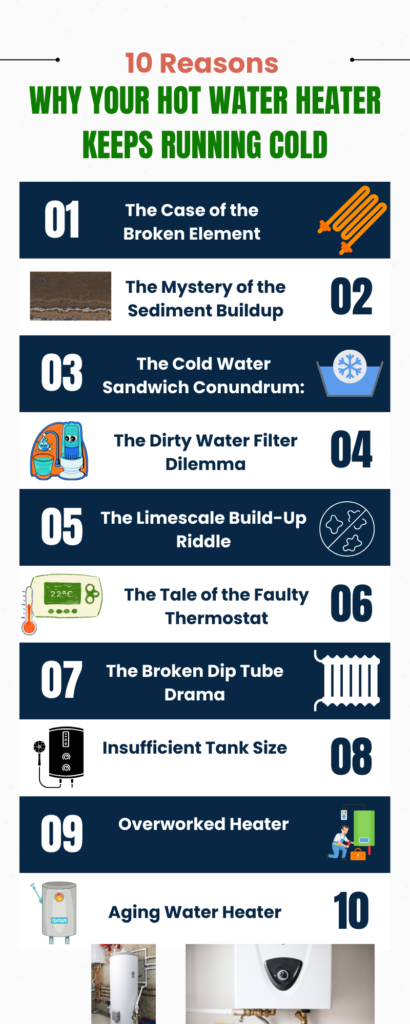Greetings! As an MEP engineer, I’ve spent years designing, implementing, and troubleshooting systems that keep our buildings functional and comfortable. One of the most common issues I’ve encountered in my line of work is the unpredictable behavior of water heaters.
Picture this: A client calls in, frustrated about their morning shower turning into an unexpected icy challenge. Over the years, I’ve compiled a list of usual suspects behind such issues. Today, I’ll share these with you, not as an engineer to a client, but as a friend sharing tales from the field.
1. The Case of the Broken Element:
Background: Electric water heaters rely on two heating elements, akin to two chefs working in tandem in a kitchen. If one chef (or element) is out of commission, the entire cooking process (or heating process) is disrupted. Over the years, I’ve seen several instances where one of these elements malfunctioned due to electrical surges or simple wear and tear.
Solution: Regular check-ups can identify potential issues. Replace malfunctioning elements promptly.

2. The Mystery of the Sediment Buildup:
Background: Picture a riverbed over time, collecting silt and debris. Similarly, minerals from water settle at the bottom of the heater, forming sediment. In some older buildings I’ve inspected, this sediment was so thick it significantly reduced the tank’s water capacity.
Solution: Flush water heaters regularly. In areas with hard water, consider a water softener.
3. The Cold Water Sandwich Conundrum:
Background: This phenomenon is like an unexpected plot twist in a movie. Just when you think you’re in for a warm shower, a burst of cold water surprises you. It’s caused by previously drawn cold water entering the hot water line.
Solution: Ensure consistent water usage. Check the plumbing system if the issue persists.
4. The Dirty Water Filter Dilemma:
Background: Think of the filter as a security guard, keeping out unwanted debris. Over time, this guard can get overwhelmed, leading to restricted water flow. In some extreme cases I’ve seen, the filter was so clogged that it reduced water pressure significantly.
Solution: Regular maintenance. Clean or replace filters as per guidelines.
5. The Limescale Build-Up Riddle:
Background: Limescale is like the plaque in arteries. In regions with hard water, heaters can get clogged with limescale, reducing their efficiency. I’ve opened up heaters where the limescale was so thick it looked like a layer of rock.
Solution: Regular descaling sessions. Consider a water softener for persistent issues.
6. The Tale of the Faulty Thermostat:
Background: The thermostat is the brain of the heater. I’ve been to sites where the thermostat was set correctly, but due to internal malfunctions, it didn’t regulate temperatures as it should, leading to icy showers on cold mornings.
Solution: Check thermostat settings. Replace if necessary.
7. The Broken Dip Tube Drama:
Background: The dip tube is like a traffic director, guiding cold water to the tank’s bottom. A broken tube disrupts this flow, causing temperature inconsistencies. In one memorable case, the tube was so damaged that cold water was being released directly into the hot water outlet.
Solution: Regular inspections. Replace compromised dip tubes.
8. Insufficient Tank Size:
Background: Sometimes, the issue is simple: the heater’s tank is too small for the demand. I’ve seen large families struggle with small heaters, leading to frequent cold water spells.
Solution: Assess your household’s hot water needs. Consider upgrading to a larger tank or a tankless heater.
9. Overworked Heater:
Background: Just like any machine, if a heater is continuously running without breaks, it can get overworked. In commercial buildings with high demand, this is a common issue.
Solution: Ensure the heater gets some downtime. In high-demand scenarios, consider using multiple heaters.
10. Aging Water Heater:
Background: Everything has a lifespan, including water heaters. An aging heater can become inefficient and struggle to maintain consistent temperatures. I’ve inspected heaters over two decades old that were simply past their prime.
Solution: Regular maintenance can extend a heater’s life. However, if it’s too old, consider a replacement.
Conclusion:
In my journey as an MEP engineer, I’ve realized that understanding the intricacies of systems like water heaters is crucial for ensuring comfort and functionality. Regular maintenance and timely interventions are key. And if you ever find yourself in a fix, know that there’s an MEP engineer out there with a story and a solution to share.
FAQs:
- How often should water heaters be inspected by professionals?
- From my experience, a yearly inspection is ideal to ensure optimal performance.
- Can external factors like weather affect a water heater’s performance?
- Absolutely. Extreme cold can affect the incoming water temperature, making the heater work harder.
- Is it advisable to adjust the thermostat frequently?
- Frequent adjustments can wear out the thermostat faster. It’s best to find an optimal setting and stick to it.
